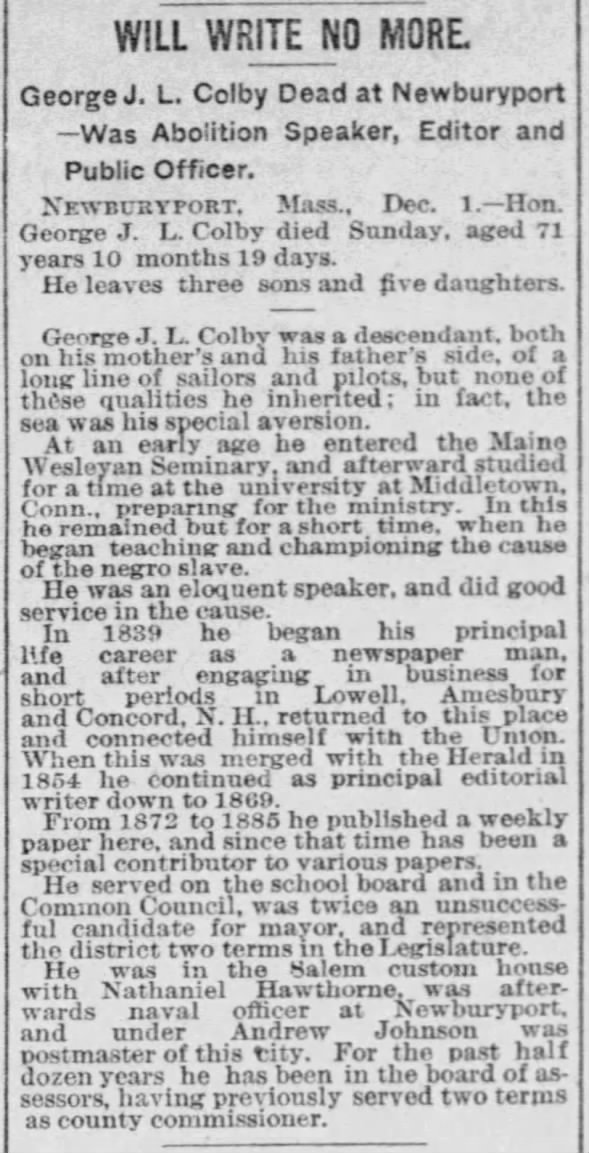Herman Melville's tale of a brave Peruvian lady named Hunilla first appeared in the April 1854 issue of
Putnam's Monthly Magazine under the title "Norfolk Isle and the Chola Widow." Published there as "Sketch Ninth," the story of Hunilla and her heroic endurance of abandonment, bereavement, and God knows what else was really "Sketch Eighth" in Melville's magazine series "The Encantadas." Later the Hunilla sketch was reprinted on pages 346-372 of
The Piazza Tales (1856), with the rest of the sketches (now correctly numbered) that made up the series. Editorial
Notes on The Encantadas (page 601) in the 1987 Northwestern-Newberry edition
The Piazza Tales and Other Prose Pieces, 1839-1860 indicate
No known manuscript, and no later printing in Melville's lifetime.
Turns out, however, there were later printings of some Encantadas sketches in Melville's lifetime. For one, all of the Hunilla sketch was reprinted from Putnam's magazine in a California gold-mining newspaper, as Melvilliana has discovered at no little expense, after renewing our lapsed subscription to NewspaperArchive. Under the major heading "The Story," the pathetic tale of Hunilla appeared in the Butte Record (Bidwell, Butte County, California) on Saturday, October 27, 1855.
Bidwell Bar (or Bidwell's Bar) was the first of the great mining camps that were settled in Feather River country of Central California. -- Western Mining History
As in Putnam's, the Bidwell, California reprinting is titled "NORFOLK ISLE AND THE CHOLA WIDOW." Also as in Putnam's, "Norfolk Isle" begins with uncredited epigraphs that Melville adapted from Spenser's The Faerie Queene and the Mynstrelles Songe in Chatterton's Ælla. Not included, the extra epigraph from Dirge in Cymbeline by William Collins that Melville would add in the book version.
 |
Butte Record (Bidwell, Butte County, Calif.)
October 27, 1855 |
The Butte Record was then owned and edited by George H. Crosette.
South of Butte and even further west, the opening sketch from the
March 1854 issue of
Putnam's Monthly Magazine appeared in the
California Chronicle of April 13, 1854 under the heading
The Encantadas, or Enchanted Isles.
(GALLAPAGOS.)
THE ISLES AT LARGE.
In added parentheses, this San Francisco version of Sketch First helpfully locates Melville's Encantadas among the "Gallapagos" islands. Melville's pseudonym Salvator R. Tarnmoor (used at the start of each installment in the magazine series but not in the book version) has been omitted in the Chronicle reprinting. At the end of the sketch, the Chronicle credits Putnam's without naming any author.
 |
San Francisco California Chronicle
April 13, 1854 |
Another previously unknown extract from "The Encantadas" is the reprinting of Sketch Third in the
Susquehanna Register on March 9, 1854. The guided tour of Rock Redondo originally appeared in the
March 1854 issue of
Putnam's Monthly Magazine. Crediting "Putnam's Monthly," the Montrose, Pennsylvania newspaper gave the main text of Melville's descriptive sketch, minus epigraphs, under the heading "The Encantadas, or Enchanted Isles."
 |
Susquehanna Register (Montrose, Pennsylvania)
March 9, 1854 |














